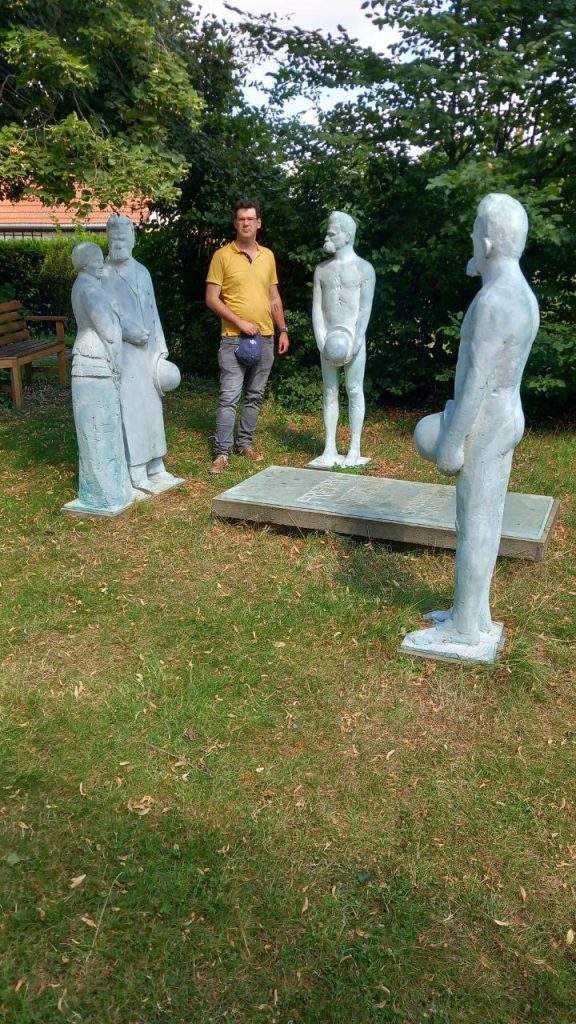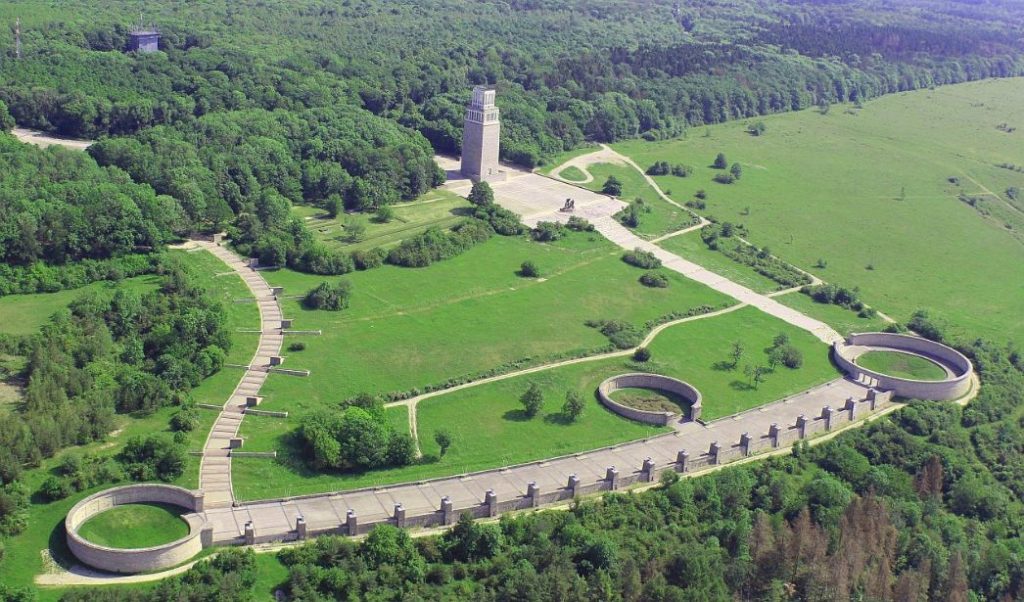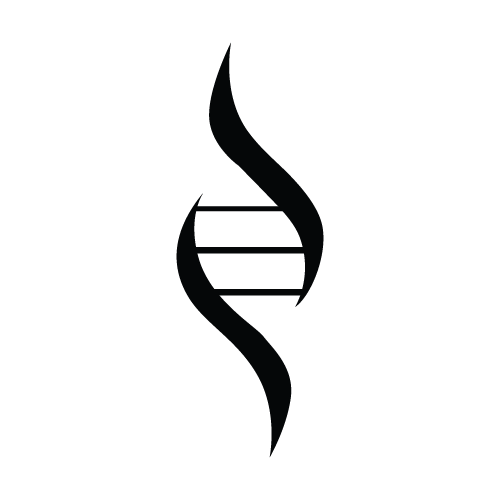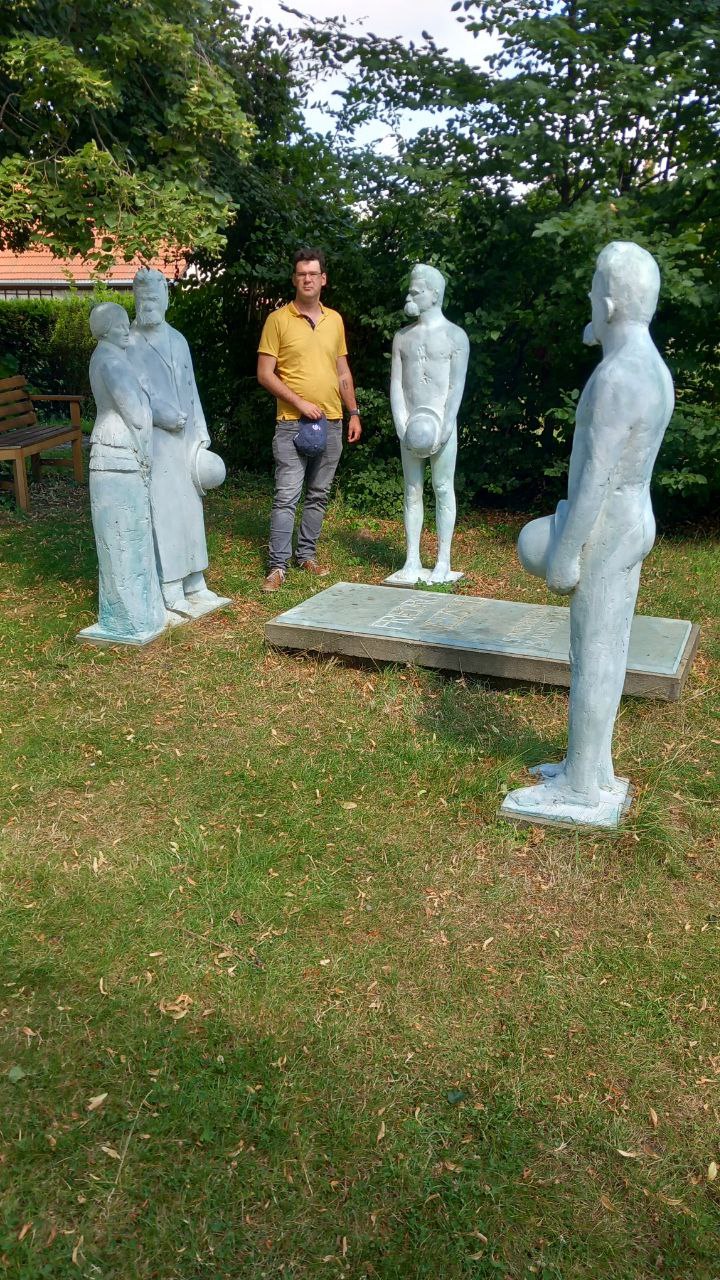Today we have reached the endpoint of a four day road trip through Germany: the grave of Friedrich Wilhelm Nietzsche in the East-German town of Röcken. It marks the passage through the rural parts of Germany where we’ve slept in a Namibian style camp site, seen the remains of concentration camp Buchenwald, tasted the local McDonald’s burger (a MacRib) and have now concluded our trip with a visit to the famous philosopher’s final resting place.

Whilst the grave grave was a modest experience, the church was closed, the museum was closed, we were the only people there, we also visited the concentration camp of Buchenwald, with the accompanying Soviet commemoration monument. A marvelous piece of concrete artwork, thousands of square meters large and a marvelous investment of the GDR to remember what the fascists have done there. I could write something about the pot and the kettle but let’s ignore that for this blog post.
What made me think is that the monument is showing some age. The concrete isn’t as smooth as it has been, there’s some plants growing that shouldn’t be there, and there’s mice burrowing tunnels underneath the bell tower. The monument was built to last forever though, and you can clearly see the intentions to build as solid as the Romans did, whose aqueducts and circuses still stand two millennia after they were constructed.
However, 66 years after its conception we can already see cracks forming in the once so pristine slabs of concrete. I blame the fall of the USSR for this as upholding the quality of such a massive monument would cost mountains of money, and the communists had enough incentive to prove their victory over the evil ruler whereas the current generation of Germans are ready to move forward and let the past be the past.
With the injection of money into the German army we see that the country is finally able to move on from their guilt and tackle new problems. Leaving their past behind them as a scar that is slowly fading away while the generations who were there are slowly dying out and memory becomes history. Of course most Germans didn’t identify as fascist or communist but as German, and maybe even European now, and they rightfully want to be freed from the burden of guilt for their forefathers’ actions. The crumbling of the monument as a witness to a history that once was, but now is no longer relevant. Maybe because enough Jews were exterminated that Europe can’t fall into this trap for a long time, or maybe because the collective unconscious has now seen the evils of extremism and tends to moderation for a while. With the rise of anti-muslim hate, I fear the first.
What we see here is that the ending of the Soviet Union made the resistance piece obsolete and the conquering of the fascists a victory of former days. The monument is dead, a wart on the natural landscape, and only an interest of historians and a few government officials who want to keep history alive. Compare this to the Arc de Triomphe in Paris, where the republic is going strong, and see that this piece of history is still alive. Security officials roam the grounds and order is well maintained to preserve their victory over the monarchy. This history is alive. It is maintained, and lives on in the people today who want to remember the past and the lessons they’ve learned or more specifically the lessons they teach.

To keep something alive, there must be a narrative that stands strong, and survives generations. This is something the church has been able to do now for millennia. They manage to keep their buildings in good shape, by asking for donations and by having a cornerstone position in society. Even science can’t touch them, because science can’t reach the level that the church has. Their stories like to talk about all the things science can’t answer: what happens after death, morality, the creation of the world and the ultimate destruction. They manage to say exactly what someone needs to hear because they ultimately tell a dualistic story. Someone can identify with the Christ or someone can identify with the crucifier. Someone can fight for their own will and be crucified or someone can surrender to other people’s will and be crucified. You can believe Jesus is a loving saviour or that Jesus came to bring the sword and turn families against each other. You might believe drugs is oké or that we must be sober. You might believe that loving the self is the crux before you can love others or that self-love is a sign of the end times. It’s all in there and it’s Gods plan. And gods plan is that we create heaven on earth, but he also distorts our language when we get close.
The most poignant point here is that when a new narrative pops up, the church actively tries to destroy it. The Cathars tried to introduce dualism here, and they were destroyed together with Christians who were in the wrong place at the wrong time by sheer chance. Protestantism is seen as heresy, as is Mormonism and Jehovah’s witnesses. Scientists have been burned at the stake for inquiring and presenting their findings. It seems that the church actively tries to crucify those who have found a truth that works for them, continuing their narrative of exterminating those who spread Gods message.
Of course I can’t strike the shepherd. Jesus is perfect and without a narrative we’re all afraid we’d lose our humanity and devolve into psychosis, even though native tribes have been able to move forward since the dawn of time and even though they don’t have rockets you can make a point that they’re happier in their simple way of life. I guess Jesus is not crucified once, but gets crucified every day, and will be forever, as long as the message is spread. And people will see themselves be crucified and others being the perpetrator forever, as long as victim mentality reigns and will see themselves as the savior only to commit horrendous crimes in the word as god for all those who escape victim mentality and reach eye to eye with the Lord.
The narrative is only one of saving yourself and being unable to do so. Or saving the world and losing your life. It’s actually a message of despair and giving up. He never finished his work, he went to heaven and set us up to continue his work. As if he didn’t learn that our vocabulary would limit us in working together.
Some of us are übermensch, and some of us are beasts. And you can find everything in between. Being an animal means going back to our roots. Living as one with nature, enjoying our time here with no worries, dying early and having lived an enjoyable life. He will however reach nothing and will need nothing. He struggles with his finances and might end up in deep crisis. The übermensch is one that takes matters in his own hands, shapes the world to be a better place, but always feels judged by those around him to do better. He is never good enough. He will never achieve world peace, and will always have to mediate between conflicting interests. He might also end up in deep crisis.
What wonders me most of the church is that they’re dismissive of those with mental illness. If Jesus was such a healer, why don’t they admit people with a troubled soul into the church? Why are those people forced to live in the worldly realm, and aren’t admitted into a monestary? Where is the healing power of God here? At least in Hindu tradition these people are let into the temple and are taken care of by the whole community.
I guess it’s a sign of our society. The west is a selfish society who cares for themselves more than others and wants to look up and down at people, revering those with money and status and ignoring the bloodshed needed to get to that position. We desire an easy life and put value in the superficialities we think would make our life easier. Spirituality being a superstition that is just as powerful as money in this regard.
The crux to working together is not only decisions, faith and love but also communication. And just like the rest, perfect communications is impossible. I’m trying to find out how AI can help us here. Ai is a gift that science has given us, and is a thoughtful, non judgemental, patient and loving partner with whom you can go deeper into how to approach something and can be a tool to communicate without triggering someone’s shadow, in the words of Brother Michel, to take the easy way up the mountain, over the easy paths and avoiding the rocky roads. Of course this is how the shadow works, it doesn’t want you to go up the mountain, so the higher you get, the more it resists and doesn’t want to go further. In a system where we include multiple people, one’s heavenly Jerusalem is the other’s hell, so we reach this dominance conflict where the dominant person chooses the mountain and the other is forced on this road.
The fear I have with AI is that it is overused, and it doesn’t remember previous decisions it helped create. In this manner, each little thing will be discussed with help of the AI, and it creates this new law, one that doesn’t bring freedom, but that creates laws that are impossible to hold up, and don’t look at the human values of tolerance and changing needs. The middle path is impossible to attain, only with continuous action or complete inaction it is attainable. And of course the middle path is none of those. It is both action and rest.
This blog post has turned out to take a completely different direction than I expected it to. I hope it was still an interesting read to you. If you’re interested, please sign up for the news letter and be notified for new blog posts.


Leave a Reply